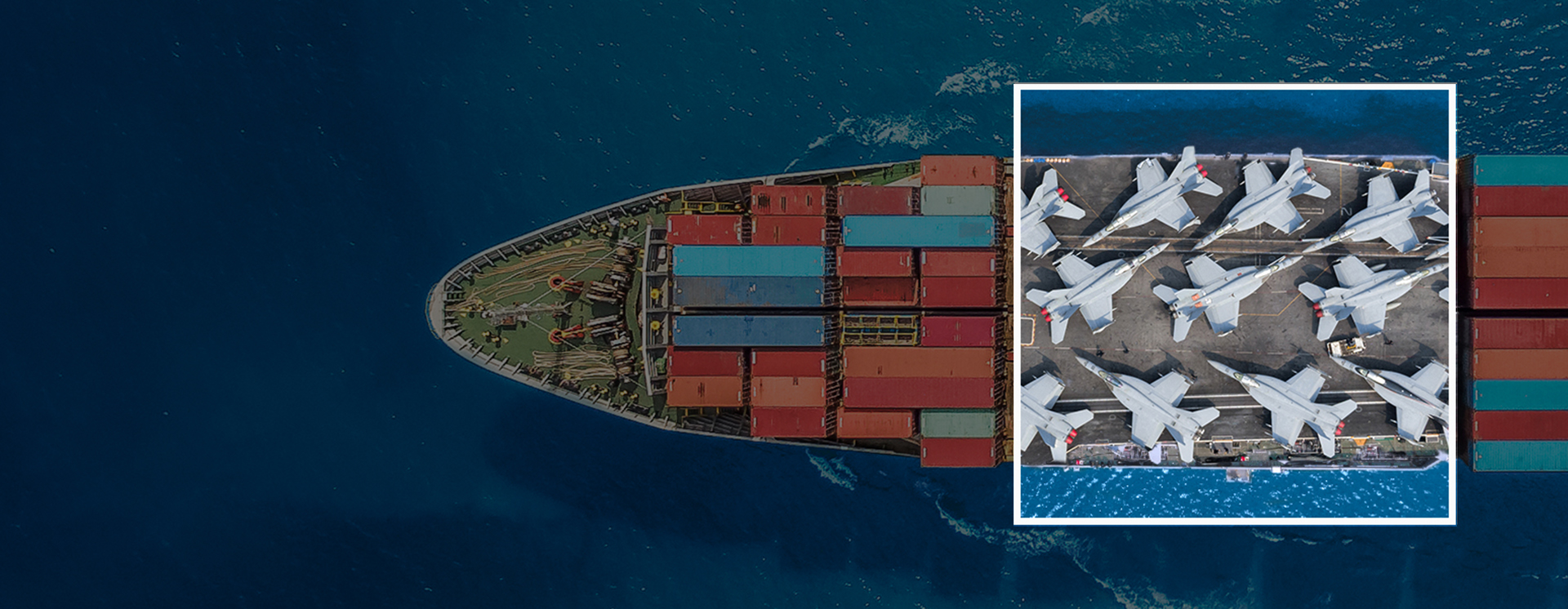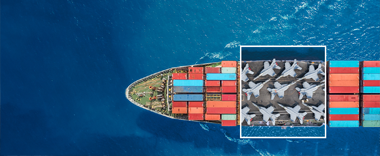On the front foot against geopolitical risk
War has long been viewed as a nearly uninsurable risk; the war exclusion is almost as old as the insurance industry itself. Companies and individuals faced with a known risk may be able to purchase a separate war risk insurance policy however, and as demonstrated in response to the Ukraine war, specific coverages can be arranged through cross-sector collaboration to support the safe passage of vital exports and relief efforts.
Our products provide people and businesses with a backstop against financial loss and the insurance industry provides guidance and expertise to help customers understand their vulnerabilities and strengthen their resilience.

Key product considerations
Political risk insurance
Assets and funds located in politically volatile regions can be vulnerable. Political risk insurance provides protection against losses from government actions like expropriation, currency inconvertibility, confiscation, contract breaches, and political violence.
Contingent business interruption (CBI) insurance
Businesses inevitably rely on other companies for raw materials, components, or products. If a supplier is unable to provide goods and services on time due to events such as geopolitical conflicts, it can create a knock-on effect down the supply chain, especially if alternative suppliers are unavailable. CBI insurance protects businesses from costs associated with declining turnover, loss of profit, and accrued charges caused by disruptions from third-party suppliers or customers, which impact the business’s ability to produce products or deliver services as usual.
Marine & Aviation insurance
War risk coverage is an exclusion that can be added back into aviation or marine policies to cover losses due to grounded planes or rerouted shipping and items lost in transit or damaged cargo. Following the outbreak of hostilities, collaborative initiatives between governments, NGOs and insurance have the power to tackle some of the resulting pressures on global supply chains. For example, the Black Sea Grain Initiative brokered by the United Nations created a safe trade corridor for commercial food and fertilizer exports from Ukrainian ports, allowing Lloyd’s to provide insurance through Marsh’s 'As One' Marine Cargo and War Facility. This was up followed by the Unity Insurance Facility which provides affordable war insurance for critical food and other non-military cargo.

Kidnap & Ransom insurance
It is possible that high profile or politically connected executives may be targeted during geopolitical conflict. Kidnap and ransom insurance provides both financial and specialist crisis response support in the event of a kidnap and extortion situation.
Credit insurance
Political unrest can lead to frozen funds, asset seizures and shipment delays, which may result in non-payment or non-fulfilment of contracts by trade partners or suppliers. Credit insurance protects over $3 trillion of global trade10 from losses due to non-payment of commercial debt, helping businesses maintain their capital and cash flow.
Medical insurance
Journalists, humanitarian aid workers, war crimes investigators, business executives and visiting dignitaries are just some of the people who need to be able to safely work in a conflict zone. Specialist medical insurance, such as the Lloyd’s market backed Ukraine Response product, can support with medical bill costs, medical evacuation, medical repatriation, and crisis cover. As part of the coverage, policyholders are supported with essential travel risk management tools such as pre-travel safety briefs, itinerary tracking, incident alerts, and security advice to help reduce their risk exposure11.

War on land insurance
Assets located within conflict zones and overland transportation routes are inherently vulnerable during geopolitical conflict. They are at risk of being targets for attack or getting caught in the crossfire. In May 2024, Willis Towers Watson partnered with Ukrainian insurer, VUSO, to launch the first London-backed facility offering war-on-land insurance, providing critical coverage and certainty for businesses transporting goods overland in Ukraine. This helps to alleviate supply chain and trade stressors as goods are protected during the journey to their intended destination.

Reconstruction
Reconstruction is an important part of ensuring future resilience of the invaded territory. This requires private and public investment backed by the international (re)insurance industry’s financial strength, to finance the rebuild. In June 2023, Aon, Lloyd’s, and Vienna Insurance Group (VIG) announced a collaboration to provide treaty and facultative (re)insurance in Ukraine to bolster Ukraine’s economic resilience and support its reconstruction post-war.
Facing into a braver future
The insurance industry holds unrivalled expertise when it comes to understanding complex risks and there are always opportunities to innovate and change. To help those affected recover from losses as a result of conflict, and prevent wider economic and societal issues arising, insurers can look to:
Develop tailored and relevant coverage: Supply chains have become more vulnerable to conflict in some areas of the world, particularly unavoidable ‘pinch points’ where access to global commerce is controlled by a single national power. By working with customers to better understand their supply chain risks and contingency plans; the insurance industry could provide relevant tailored coverage.
Analytics: This insight can be used to build new solutions that can support critical supply chains such as food and medicines which may be affected in times of increased territorial tension.
Product innovation: The insurance industry can leverage its experience, historical data, and analytical tools to help better understand the geopolitical risk landscape. This insight can be used to build new solutions that can support critical supply chains may be affected in times of increased territorial tension. For example, products like Trade Disruption Insurance (TDI) have made significant strides by covering political risks and supply chain volatility with room for wider adaption. The innovative solutions that have emerged from the Ukraine war also demonstrate the insurance industry’s ability to problem-solve the most complex challenges. This solution-orientated attitude should continue in the event of future conflicts.
Understand the exposure: Internet outages connected to geopolitical conflict could trigger a range of policies and claims from a single event. As connections to the internet grow – an estimated 600,000 new users every day[12] – the potential for a large loss from a shutdown increases too. It is important for insurers to consider how exposed they are to claims from a variety of sources and policies and adapt their approach accordingly to provide sustainable cover.
[12] Individuals Using the Internet (% of Population). (The World Bank, 2021)

The government perspective
Geopolitical conflicts, as recent events have starkly demonstrated, can trigger a cascade of disruptions with far-reaching impacts on the global economy. However, governments hold significant power to mitigate these effects and maintain greater economic stability by proactively managing and restructuring their country’s key supply chains.
De-risking supply chains
One of the key vulnerabilities for any state is an overreliance on imports of essential commodities, such as energy sources, food, or electrical components, especially when these are sourced from states with potentially divergent political or security interests. The ongoing war in Ukraine is a prime example of how such dependencies can force difficult trade-offs between a nation’s economic interests and its security priorities. Governments can build resilience to these risks by developing a comprehensive supply chain strategy. This might include contingency plans, supply chain diversification, and the reorientation of trade patterns toward allies. The goal is to safeguard the economy from the expensive impacts of sanctions, reduce the leverage of adversarial states and identify critical barriers to domestic prosperity. The UK’s “Critical Imports and Supply Chains Strategy”, published in 2024 by the Department for Business and Trade is one such example.13
Support industry
Where shipping lanes are blocked or there is a backlog, containers can start to back up in port - as seen when lockdown restriction eased from the COVID-19 pandemic. To free up supply, governments can insist on prioritising critical loads, adjust freight rates or open additional port capacity. Items such as healthcare equipment or fuel, for example, can be fast-tracked along routes. To further secure critical supply chains, governments can look inward, emulating models like the United States’ recent efforts in the semiconductor industry. Subsidies can be given to local manufacturers to diversify and create domestically controlled supply chains. Such measures can help to reduce any dependency on foreign suppliers and allow essential goods to remain available even during international crises.
Negotiation
In times of direct or imminent conflict, protecting national economic interests is crucial. Doing so may involve diplomacy, financial instruments such as trade tariffs or sanctions, and direct military action. When countries become indirectly involved, for example businesses experiencing losses as third parties to conflict losses, governments may only be able to react with diplomacy, or adjust domestic policy to soften any blows.
Overhaul system weaknesses
Government systems are reliant upon the internet and are vulnerable to possible targeted internet shutdowns from an aggressor during geopolitical conflict. Governments should review the holdover technology that underpins national infrastructure networks to ensure limited contagion from an internet outage to other critical systems. It is important to take proactive action towards fixing the inherent weaknesses or vulnerabilities in existing online systems, including assessing whether centralisation – helpful most of the time – is an appropriate set up to mitigate disruption from internet outage.
Explore the impact of volcanic eruption
The economic impact
Disclaimer
This report has been produced by Lloyd's Futureset and Cambridge Centre for Risk Studies for general information purposes only.
While care has been taken in gathering the data and preparing the report Lloyd's and Cambridge Centre for Risk Studies do not, severally or jointly, make any representations or warranties on behalf of themselves or others as to its accuracy or completeness and expressly exclude to the maximum extent permitted by law all those that might otherwise be implied.
Lloyd's and Cambridge Centre for Risk Studies accept no responsibility or liability for any loss or damage of any nature occasioned to any person as a result of acting or refraining from acting as a result of, or in reliance on, any statement, fact, figure or expression of opinion or belief contained in this report. This report does not constitute advice of any kind.
Note that this report does not seek to replace or inform any of the mandatory scenarios which Lloyd’s publishes to support the Realistic Disaster Scenario exercises managing agents are required to undertake in respect of the syndicates managed by them.





